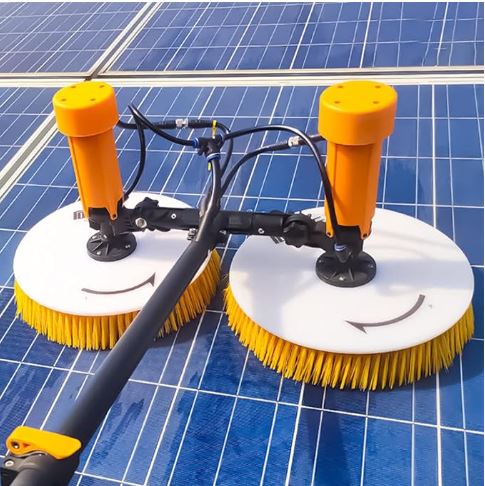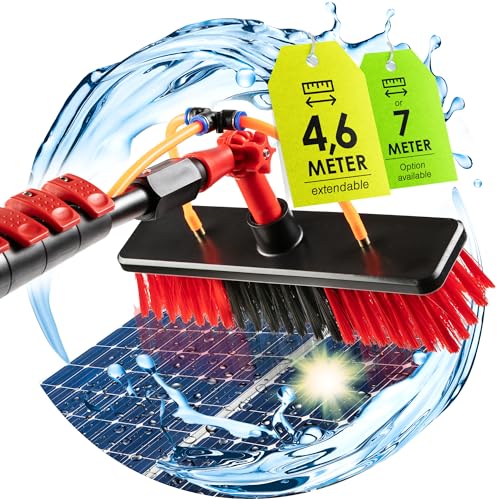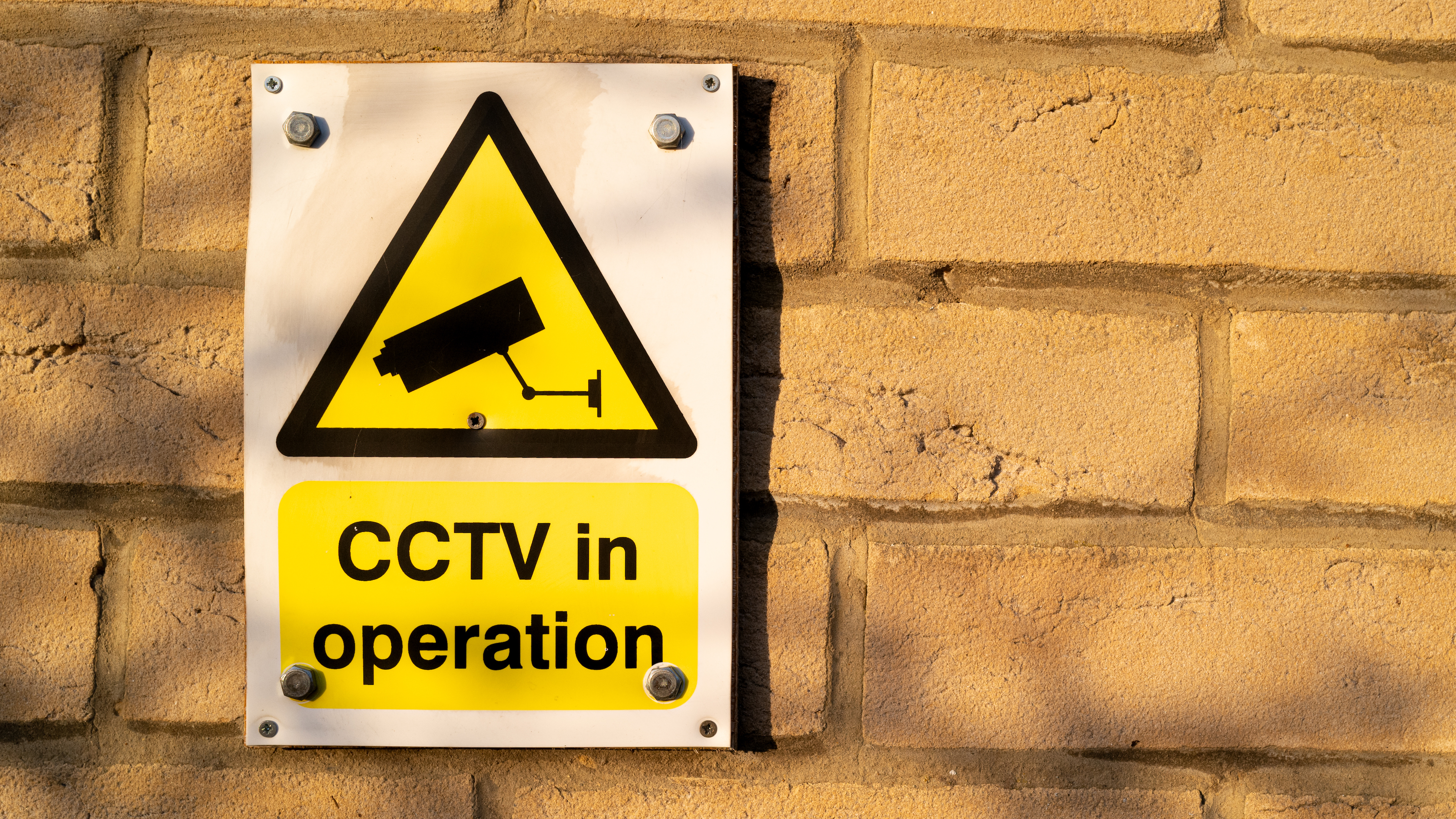How to clean solar panels — and why never to wash them during a heat wave
We look at how often you should clean solar panels to keep them working at full efficiency, what is involved as well as when to do it

Knowing how to clean solar panels is key to making sure your technology keeps working at full capacity. Dirt, bird mess and other debris not only will make your panels look shabby but it can impact their efficiency and how much energy they generate for your home.
The majority of solar panels in the UK are actually self-cleaning, which means that they have a hydrophobic coating that protects the panel surface by preventing water droplets from sticking to them. This prevents the gradual build-up of minerals on the solar cells, because when droplets of rain fall from the sky they bring particles of dirt with them.
However, this often isn’t enough to keep the panels clean and generating electricity as efficiently as possible means that the panels also have to be cleaned periodically. This guide explores how you should do that.
Why cleaning solar panels is necessary
Solar panels need to be kept clean in order to prevent dirt and grime from building up on the surface of the panels and reducing their efficiency – a factor which plays in part in the answer to how long do solar panels last.
The experts at Solar Panel Cleaning Ltd explain that if you don't regularly clean your solar panels dust can accumulate and even just one dusty cell can affect the performance of the entire panel. Plus, given the upfront cost of solar panels, keeping this renewable technology in good shape with careful maintenance should be at the forefront of a homeowner's mind.
This is especially true if you benefit from solar panel grants whereby the efficiency of your solar array could impact the amount the grid will pay you for surplus solar energy.
Katharine Allison, energy-saving expert at Independent Advisor Solar Panels, adds: “Solar panels are designed to be self-cleaning to a degree, and thanks to the amount of rain we get in the UK, most debris should be washed off without any input. However, dirt and large detritus can still build up over time, reducing your panels' efficiency."

Katharine is the Independent Advisor's energy saving expert. She is an advocate for sustainability, in particular solar panels, double glazing and renewable energy technologies. She has over 10 years of experience in the eco sector and has worked with the Federation of Master Builders, Architectural Digest, and Denon Construction.
Why you should never clean solar panels in a heat wave
As a general guideline, solar panels should be cleaned every two to three years, but this can vary depending on your location and climate. Solar panels located by the sea, near dusty farmland, or in a highly polluted area should be cleaned more frequently.
Cleaning before the summer months is common sense; your solar panels will be at their optimum, ready to ensure maximum energy generation. But beware, Tom Brehme, technical manager at Sunsave, says, “Never clean your solar panels on a hot day!”
Brehme continues, “Cleaning the panels when they’re hot can increase the thermal stress on the Photovoltaic (PV) modules and potentially cause damage, such as cracks in the glass.” He adds, “This can affect their performance, and you may end up having to pay to replace your panels, unless a solar maintenance scheme covers you.”
But it's not only damage that can affect solar panels, as Brehme explains, “Heat can also cause the water to dry too quickly, leaving smudges and streaks that will just need cleaning again.” This can affect how well they work, but Brehme says, “If you have to clean your solar panels on a hot day, it's better to do it either first thing in the morning or in the evening.”

Tom Brehme has worked in residential solar installation for more than a decade and is a fully qualified electrician. He is now a Technical Manager at Sunsave, a solar subscription company.
When to clean solar panels
We get most of our energy output from our solar panels during spring and summer as the weather improves and the ideal time to clean solar panels tends to be in early to mid-spring.
Summer is still possible to clean solar panels but is less than ideal. This is because using a hose pipe to spray cold water on the panels in hot weather may potentially damage them, so on these occasions it is best to do this in the early morning or in the evening.
This happens when the glass is hot and so pouring cold water on it causes it to experience a sudden extreme temperature change (thermal stress), rendering it brittle. Over time, with repeated treatment in this manner, the glass could potentially crack. Even if this does not happen, cleaning the panels on a hot day will also leave smudges on the glass because the sun will evaporate the water too quickly.
How often you should clean solar panels
How often you clean your solar panels may depend on the type of panels you have installed and the advice of the company that installed them initially and/or the manufacturer.
Typically you'll need to clean your panels every six months, or at least one a year. (You may need to clean them more frequently if they are exposed to dirt and grime, for instance, in an urban area or in close proximity to trees.)
That said, most solar pv panels in the UK will not need any heavy-duty cleaning because regular rain will wash most dirt and grime off the surface, dispelling one of the myths about solar being its difficulty to clean.
How to clean solar panels
A monthly wash with a hose pipe may be enough for a while to get rid of the dirt and grime that is not otherwise washed away by the rain. However, this may not get rid of any accumulated moss that may have built up. Here's our guide on how to clean solar panels, taking into consideration the different types of debris that maybe making them less efficient.
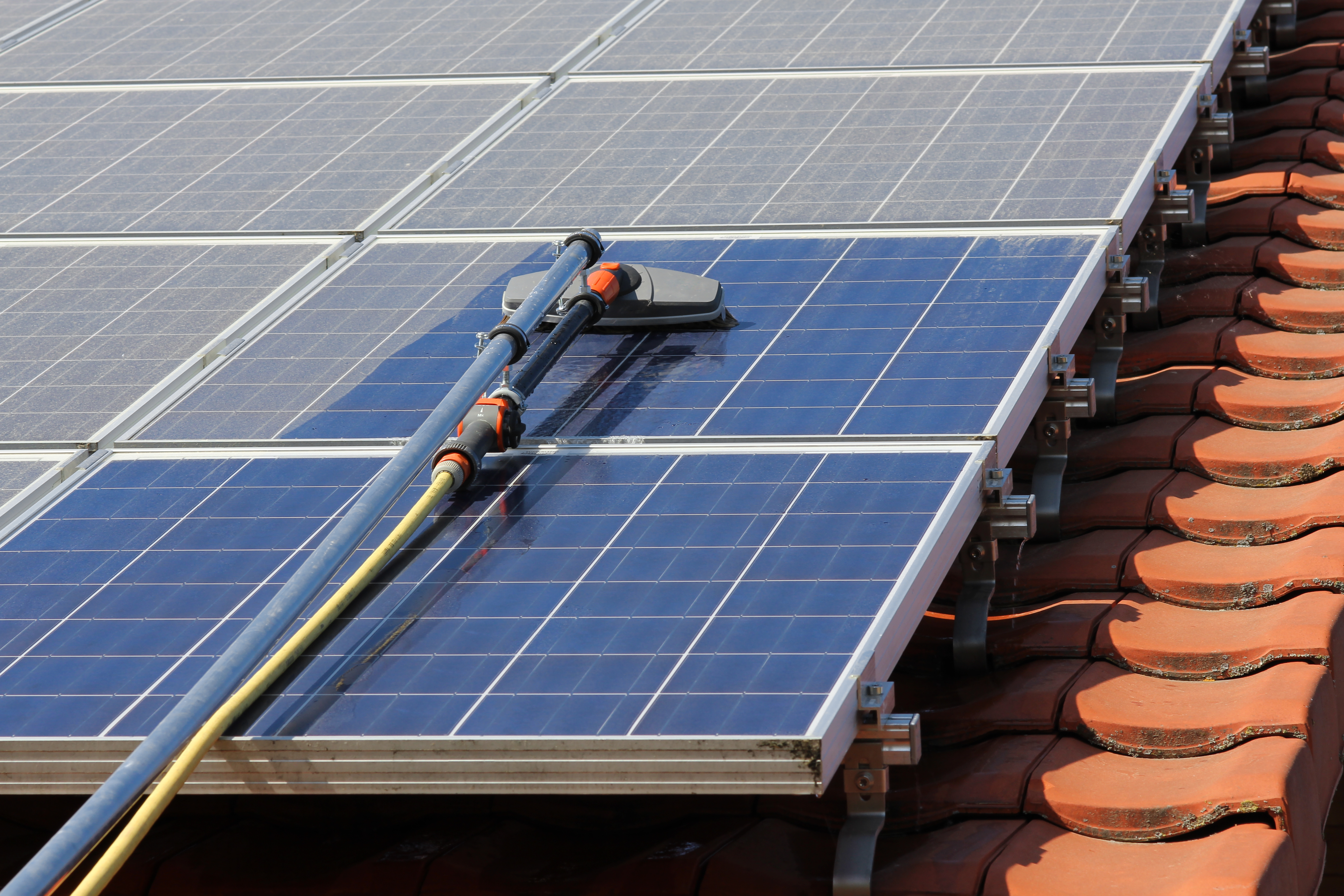
Before you get started
Before you attempt to clean your solar panels it is important to take a look at the following checklist, compiled by solar panel expert Katharine Allison:
- Safety first: Always prioritise safety when cleaning solar panels, especially if they are on rooftops. Most systems can be cleaned from the ground using a long-handled brush, reducing risk. If you can't reach the panels safely or are unsure about the process, hire a professional, as annual cleaning is typically sufficient.
- Optimal timing: Clean your solar panels in the early morning or late afternoon when they are cooler. This prevents water from evaporating too quickly, which can leave streaks or residue and affect efficiency. Cooler panels are also safer to clean.
- Check warranty: Review your solar panel manufacturer's warranty guidelines before cleaning. Some warranties have specific instructions or restrictions on cleaning methods to avoid voiding the warranty.
- Monitor performance: Regularly check the performance of your solar panels to detect any significant drops in energy production, which might indicate the need for cleaning or maintenance. Most systems have a monitoring feature, and many newer systems include apps to track output.
- Check for shading: Before cleaning, assess the area for any potential shading that could affect your solar panels' performance. Over time, vegetation growth or nearby structures may cast shadows, reducing efficiency. Trim any overhanging branches or foliage, and consider repositioning panels if shading is a persistent issue.
Six steps to cleaning solar panels
There are six simple steps to get the most out of your solar panels, according to Allison:
- Step 1: Assess the situation: Evaluate the condition of your solar panels to determine the extent of cleaning needed. Look for visible dirt, dust, bird droppings, nests, leaves, or other obstructions. If the panels are particularly dirty or hard to reach, consider hiring a professional.
- Step 2: Choose the best approach: If your solar panels are on the roof, consider using a telescopic window cleaning pole to clean them from the ground instead of using a ladder.
- Step 3: Mix your cleaning solution: In a bucket of warm water, mix a small amount of mild detergent or use a specialised pre-mixed solution. Avoid abrasive cleaners or harsh chemicals that could damage the panels. Stir until the detergent is fully dissolved.
- Step 4: Gently wipe the surface: Dip a soft brush or sponge into the cleaning solution and gently scrub the surface of the panels, working from the top down. Use light pressure to avoid scratching.
- Step 5: Rinse thoroughly: Rinse each section with clean water using a hose or gentle spray to remove soap residue and debris, paying special attention to the corners and edges.
- Step 6: Dry with a squeegee: Remove excess water with a squeegee for a streak-free finish. Wipe in a single direction to prevent streaking. Use a microfiber cloth to buff any remaining water spots.
Special kits are available for cleaning solar panels, usually consisting of biodegradable soap, a wiping implement and a soft brush, sometimes with a long handle. This solar panel cleaning kit on Amazon doubles up as a window cleaning brush while more specialist solar panel cleaning kits can be much more expensive, such as this cleaning kit on Amazon with a rotating brush on a telescopic rod.
You can also get kits that include biodegradable soap, a wiping implement and a brush like this 3-in-1 design from Amazon.
How to clean moss off solar panels
Lichen growth on solar panels is driven by microscopic algae living alongside it in a symbiotic relationship. Lichens are not plants and they produce their own food via photosynthesis, eliminating the need for water.
This means they can grow in locations where other plants would not survive — solar panels being one such location. The only way to remove lichen from solar panels is to remove the algae that stimulates its growth.
This is another reason for cleaning solar panels regularly. Some companies use special anti-algal chemicals to remove lichen once it starts to become established. However, a diluted vinegar solution is also effective which will also kill moss, which tends to grow especially in locations where there is a high atmospheric moisture content.
How to clean bird droppings from solar panels
Birds often see solar panel arrays as an attractive place to perch and nest and droppings can also be a problem. To deter birds, the solar panels should be kept free of debris such as twigs and other detritus. A thin strand of chicken wire attached to the edge of the panels preventing any access to the underside of the panels is also a good idea.
To clean droppings off the surface, regular cleaning with a mild detergent should be sufficient, a soft brush on a pole is even better to help scrub the droppings off, as they tend to be more resilient than other dirt and grime.
Try these tools for cleaning solar panels
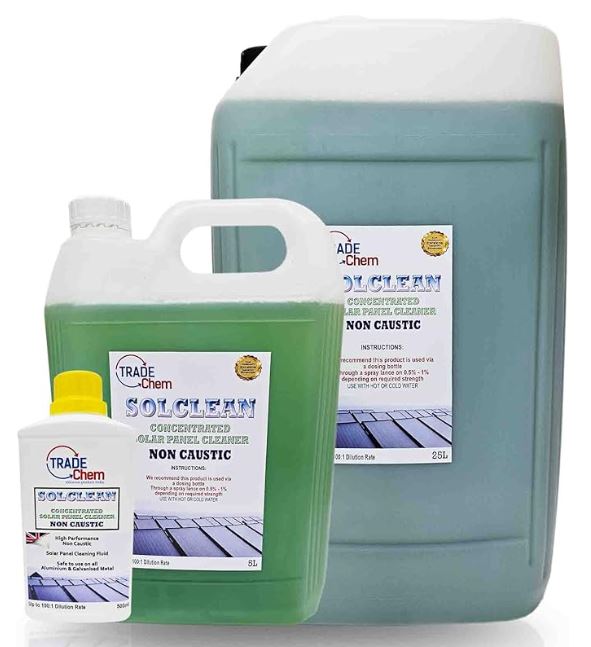
SolClean claims to be 100% biodegradable and environmentally friendly and is safe on most types of solar panel surface including the frames and seals. It can be used on both solar thermal panels as well as solar PV and is a non-caustic formula.
DIY vs hiring a professional
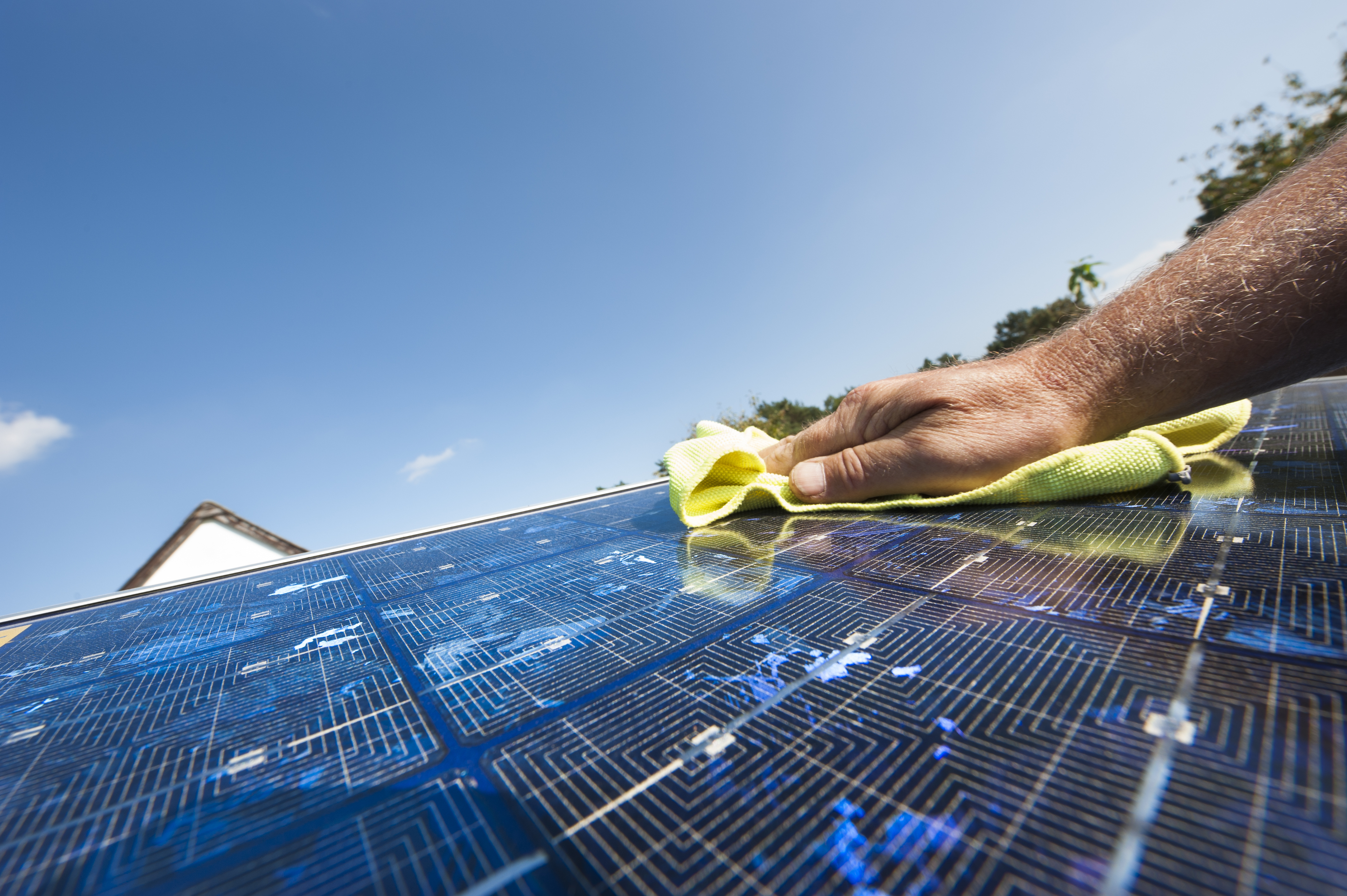
Cleaning solar panels yourself
You can clean your own solar panels, but doing so may affect the warranty, which is a good reason to hire a professional instead.
Make sure you use a safety harness and ropes if you feel you need to climb up onto the roof, especially given the roof is likely to be slippery.
If you are short on time, cleaning the panels regularly with a hose pipe might be enough to get rid of any small amounts of dirt or grime before they build up. Another option is to install an automatic cleaning system as part of your solar panel array.
When to opt for a professional
Hiring a professional can be much safer if you feel someone needs to get up on the roof to clean them and you do not have the right equipment or are not confident working at height.
In the UK, paying a professional to clean the panels is likely to cost somewhere between £80 and £255 (according to Checkatrade), reflecting the cost of safety equipment and training, ease of access and the condition of the panels.
If you have a solar powered house, or has a vast solar array, paying a professional may be well worth the money compared with the time and effort of DIY.
Cost of cleaning solar panels
"Solar panel cleaning costs between £4 - £15 per panel. The total solar panel cleaning costs will be affected by several factors, the biggest of which would be if your solar panels are on the ground floor or on upper floors," explains Checkatrade.
"The higher the panels, the more expensive they will be to clean. To clean a bank of 40 solar panels on the ground floor, the cost will start from £80. To clean the same bank of solar panels (40) above one storey, the average cleaning solar panels cost increase to as much as £225."
Katharine Allison, energy-saving expert at Independent Advisor Solar Panels, says: "And while many homeowners will opt to have their panels cleaned professionally, this can cost around £150 for a system of 10 panels and for most people, the prospect of cleaning them yourself doesn’t need to be too intimidating.”
Of course, if you can and do opt for the DIY approach, there will be an outlay on cleaning equipment too.
FAQs
Is it OK to power wash panels?
Solar panels are not designed to take the impact of a high pressure stream of water from a pressure washer.
Furthermore, a grid-connected solar panel array with solar batteries is a high voltage electrical system which is potentially dangerous if it is damaged. Doing this will therefore almost certainly invalidate the warranty.
Can you use vinegar to clean solar panels?
Vinegar is a great cleaning agent for solar panels because it contains acetic acid, which is very capable of breaking down tough stains, dirt and grease. It is also readily available and any vinegar will do although the best type to use is white cleaning vinegar.
The way to use it is to make a dilute solution using a quarter cup of vinegar and two cups of water plus half a teaspoon of liquid detergent or non-abrasive soap. To apply it, pour it into a spray bottle.
How do you clean solar panels without water?
Most professionals do not recommend the use of chemicals to clean solar panels without using water. However, earlier this year, a team of scientists at Massachusetts Institute of Technology (MIT) devised a new water-less approach using electrostatic repulsion to push dust particles off the surface of the panels.
In this approach, an electrode passes over the panel surface and the electrical charge it produces repels the dust particles. Initially, this would be more suitable for commercial and industrial-scale solar farms, as it uses an electric motor that runs on rails along the edge of the panels, but if successful a version of it might become available for domestic use.
Other researchers at the University of Washington have developed an alternative approach which uses a self-cleaning surface based on mechanical vibration.
If you are researching whether or not to install solar panels, or perhaps you are looking to upgrade your existing array, it is worth taking a look at our guides on solar thermal vs solar PV, what it is like living with solar PV as well as considering solar panels alongside heat pumps.
It might also be worth having a good read up on how do solar panels work as having a good understanding can help you monitor their efficiency and check everything is working as it should.
Get the Homebuilding & Renovating Newsletter
Bring your dream home to life with expert advice, how to guides and design inspiration. Sign up for our newsletter and get two free tickets to a Homebuilding & Renovating Show near you.

Robin is a freelance journalist based in the South West of England, UK. He specialises in environmental issues, climate change and renewable energy, with other interests in transport and green motoring. He is a regular daily correspondent for a renewable energy website, writing news articles and interview pieces on all the main clean energy technologies. He has also written widely for numerous magazines on these topics, as well as writing white papers and web content.
- Joseph MullaneNews Editor
